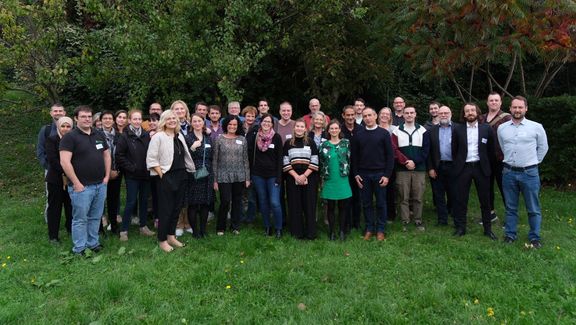During this second general meeting, researchers presented the results achieved
over the past year, highlighting progress in integrating genomic traits from wild
Helianthus species and gathering data to measure the impact of such sunflower
species on biodiversity, agricultural landscape, and economy. The first results are
starting, especially regarding the production and screening of climate-smart
sunflowers in Spain, Romania and France. Over 30 genes linked to pollinator
attractiveness, protein content, or seed quality and adapted to extremely hot and
dry US locations are identified. These genes will be tested and validated to
improve commercial sunflower seeds within the next two years.
HelEx scientists integrate their work with top European projects Booster, Tolerate,
and Agri4pol that presented their work and identified synergies to share ongoing
results and reach EU citizens. In the same line, the local researcher Prof. Dr.
Thomas Schmickl, from Artificial Life Lab of the Institute of Biology Karl-Franzens
University Graz introduced his work and develop solutions to mitigate honeybee
decline using robot-bee interactions. Other agricultural adaptation to mitigate
climate change impact, reduce phytosanitary treatments and produce local
low-carbon energy was presented at the Haidegg research center with
agrivoltaism technologies, such as solar panels protecting pome orchards.
In addition to the scientific presentations, constructive exchanges took place
through various collaborative workshops to prepare the next season 2025 in Chile
and Europe and reinforce links between research teams and industrial partners.
This project emerged in 2023 in an ecological context where climate change has
already significantly impacted sunflower seed production and quality, with
potential yield reductions of -20% to -50% depending on the region in Europe (1).
In a tense geopolitical context, with half of the world's production in Ukraine and
Russia (2), production has been growing steadily for 20 years (3% per year on
average) to reach 30 million ha in Europe (3). This project proposes breakthroughs
to accelerate innovation for this crop of the future and meet the challenges of
more resilient and ecological agriculture while contributing to reducing the
European Union's economic dependence on imports of vegetable oils and
proteins in favor of sustainable alternatives.
1 Moriondo et al., 2010 Mitigation and Adaptation Strategies for Global Change. Impact and
adaptation opportunities for European agriculture in response to climatic change and variability.
2 https://chambres-agriculture.fr/actualites/toutes-les-actualites/detail-de-lactualite/actualites/le-tournesol-en- plein-essor/
3 FAO Stats 2021 estimated data (consultation Sept. 2023)

